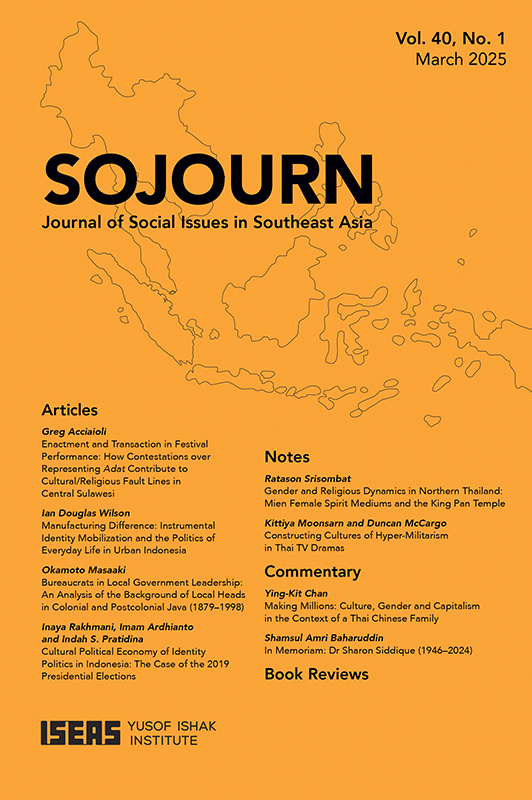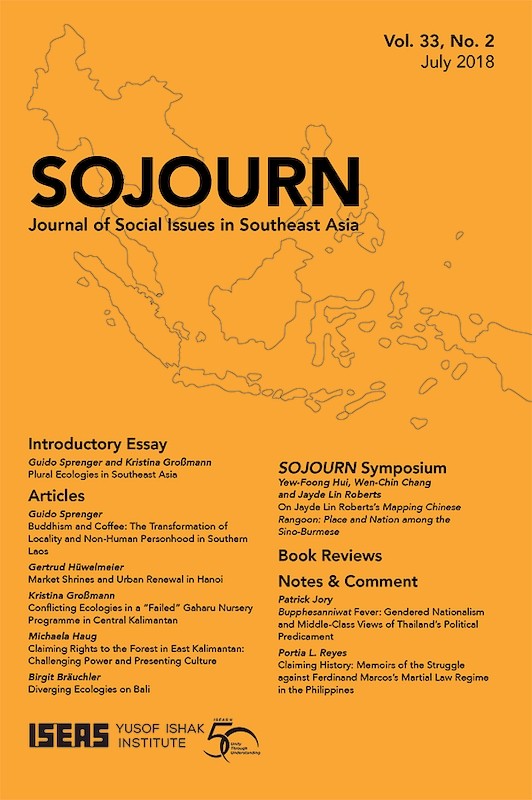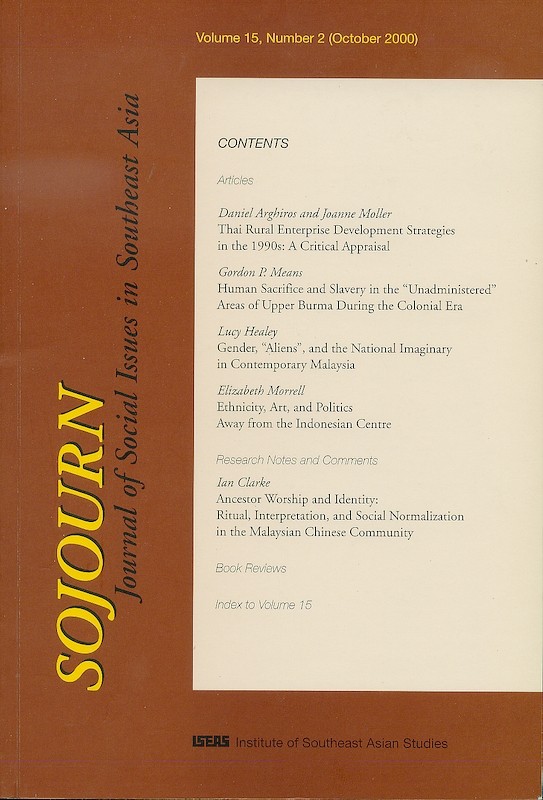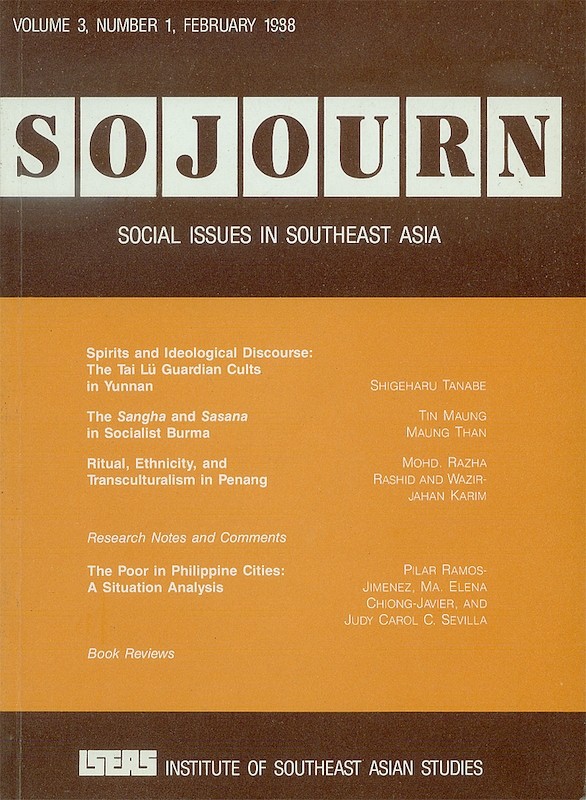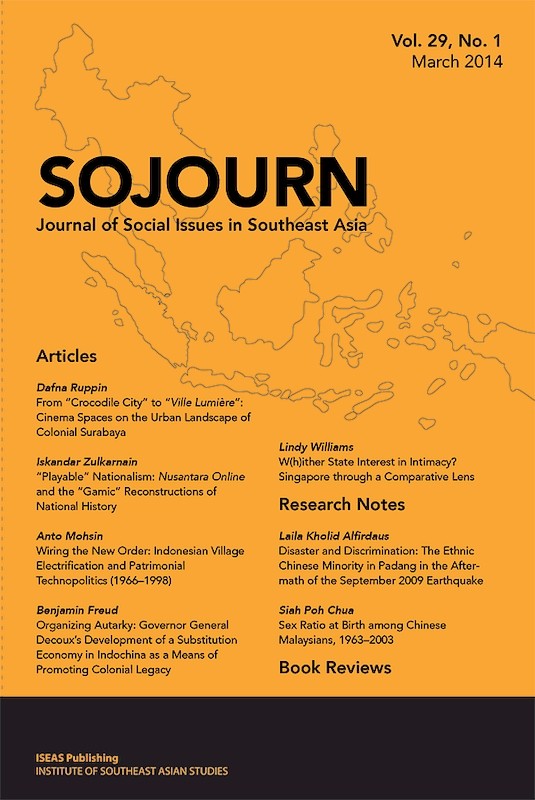SOJOURN: Journal of Social Issues in Southeast Asia Vol. 26/1 (April 2011)
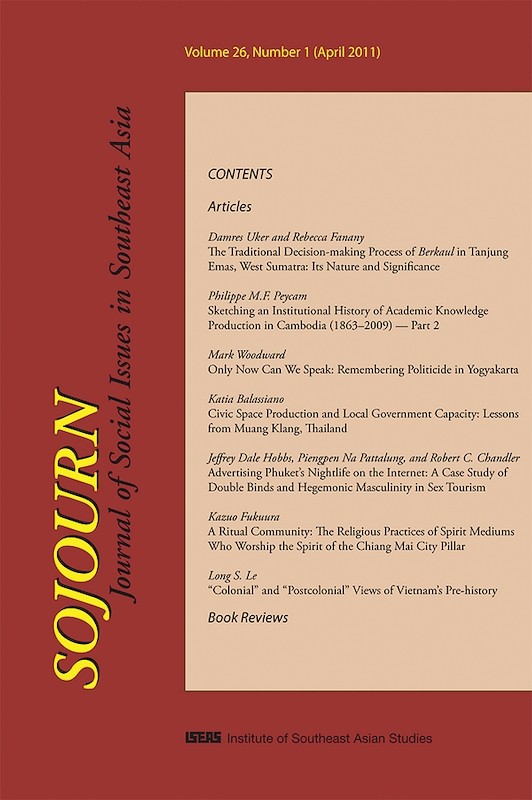
Date of publication:
April 2011
Publisher:
Institute of Southeast Asian Studies
Number of pages:
165
Code:
SJ26/1
Contents
-
SOJOURN: Journal of Social Issues in Southeast Asia Vol. 26/1 (April 2011)
[Whole Publication] -
Preliminary pages
- ARTICLES
-
The Traditional Decision-making Process of Berkaul in Tanjung Emas, West Sumatra: Its Nature and Significance, by Damres Uker, Rebecca Fanany, authors see abstractBerkaul is a traditional practice associated with the rice cultivation cycle in West Sumatra, Indonesia, intended to seek consensus within the local community about agricultural practices and management of water for irrigation. Berkaul is deeply rooted in the adat and worldview of the region but is much less commonly practiced today than in the past and has disappeared in many parts of the region. This article describes the process of berkaul in Tanjung Emas, West Sumatra, places it within the context of Minangkabau adat and tradition, and considers its value in fostering participation, empowerment, and social inclusion in the context of rural development.
-
Sketching an Institutional History of Academic Knowledge Production in Cambodia (18632009) Part 2, by Philippe Peycam, author see abstractThis paper focuses on the institutional mode of academic knowledge production in Cambodia since the beginning of the colonial period. It addresses the importance of French official orientalism represented by the Ecole Franaise d'Extrme-Orient and its role in constructing a reified narrative of the nation state of Cambodia centred on the Angkorian "golden age" while orientating intellectual "modernization" through the renovation of Buddhism. This top-down approach was pursued by the successive post-independence regimes - to the exclusion of the Khmer Rouge who systematically destroyed Cambodia's intellectual and cultural life. In contradiction with state initiatives, a few researchers - mostly French and Cambodians - chose to orientate their research toward ethnographically relevant subjects, taking Cambodian society as principal agent of cultural and historical meaning. This trend, referred to as "Khmer Studies", found its programmatic autonomy among exiled Cambodian intellectuals in the 1980s, paving the way for grass-root initiatives developed in Cambodia in the wake of its re-opening in the 1990s.
-
Only Now Can We Speak: Remembering Politicide in Yogyakarta, by Mark Woodward, author see abstractIn 1965 the Indonesian Communist Party (PKI) was the second largest communist party in Asia. Indonesian politics was predicated on a precarious balance of nationalist (PNI), Muslim (Masyumi) and communist (PKI) political parties, the military, and the country's charismatic president, Sukarno (Feith 2006; Lev 1967). In the wake of an abortive coup on 30 September, the military, Muslim, and nationalist death squads killed at least 200,000 people thought to be party members or supporters. This orgy of violence brought the authoritarian military-dominated New Order government of Indonesias second president, Soeharto, to power.1 He was to rule Indonesia with an iron hand until 1998.
-
Civic Space Production and Local Government Capacity: Lessons from Muang Klang, Thailand, by Katia Balassiano, author see abstractThailand's ongoing efforts to decentralize authority continue to reveal municipal strengths and weaknesses. This article describes how the Thailand Environment Institute, a non-governmental organization, has been building capacity in the municipality of Muang Klang by means of civic space production. The production of a new recreation complex involved processes that began institutionalizing participatory planning, is nurturing civil society, and may, over time, bolster broad and more balanced municipal governance. This case illustrates the significant role of the non-governmental organization in decentralization and how the explicit consideration of civic spaces can improve participatory planning in the public sphere.
-
Advertising Phuket's Nightlife on the Internet: A Case Study of Double Binds and Hegemonic Masculinity in Sex Tourism, by Jeffrey Dale Hobbs, Piengpen Na Pattalung, Robert C. Chandler, authors see abstractOne significant human rights violation in Southeast Asia is the exploitation of women through sex tourism. Such sexual exploitation occurs in Thailand because institutions are complacent and society accepts the practice. This case study, guided by the concepts of double binds and hegemonic masculinity, sought to understand if Thai culture is symbolically constructed in ways to portray Thailand as a desirable "sex tourist" destination. Websites portray Phuket as a patriarchal world where men can live their fantasies of being perfect hegemonic males because Thai bar girls are young nymphomaniacs that have no need to be talked to or understood.
-
A Ritual Community: The Religious Practices of Spirit Mediums Who Worship the Spirit of the Chiang Mai City Pillar, by Kazuo Fukuura, author see abstractThis article focuses on the creation of ritual communities through the various collective rituals of the group of spirit mediums who worship the tutelary spirit of the city pillar in Chiang Mai, northern Thailand. It explores how these rituals emerge as a manifestation of the group's intrinsic power of accomplishment, adaptation, and invention. Their ritual community demonstrates, in various ways, the diversity of spirit worship in Chiang Mai throughout the year. Moving through ritual spaces at will, these mediums utilize their independent and performative power in order to actively develop their religious practices.
-
"Colonial" and "Postcolonial" Views of Vietnam's Pre-history, by Long S. Le, author see abstractUntil recently, northern Vietnam was believed to be a receiver or a loan culture of a unidirectional diffusion and migration from the advanced Chinese civilization. By the early 1980s, a new prehistory of northern Vietnam was becoming increasingly apparent. Yet, new discoveries by both Vietnamese and Western scholars possess existing biases. Interestingly, as a response to the above, today's Western scholars are attempting to "rescue" the "casualties" of nationalist history in Vietnam. However, it is not clear whether this new schema would only carve out a topic of expertise for Western historians or only further marginalize particular Vietnamese nationalist histories that did not necessarily constrain "independent histories".
- BOOK REVIEWS
-
BOOK REVIEW: Submitting to God: Women and Islam in Urban Malaysia, by Sylvia Frisk, by Sharon A. Bong, author
-
BOOK REVIEW: The Ambiguous Allure of the West: Traces of the Colonial in Thailand, edited by Rachel V. Harrison and Peter A. Jackson, by Andrew Alan Johnson, author
-
BOOK REVIEW: Tours of Vietnam: War, Travel Guides, and Memory, by Scott Laderman, by Christina Klein, author

